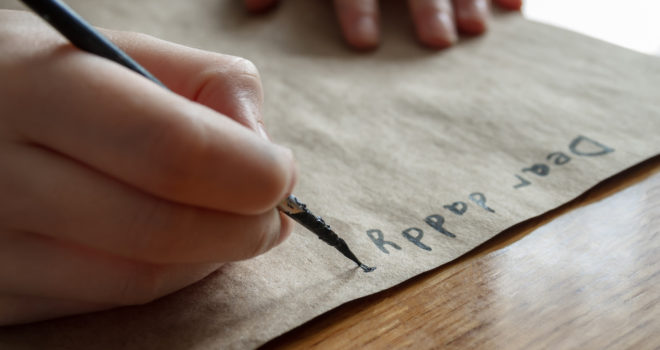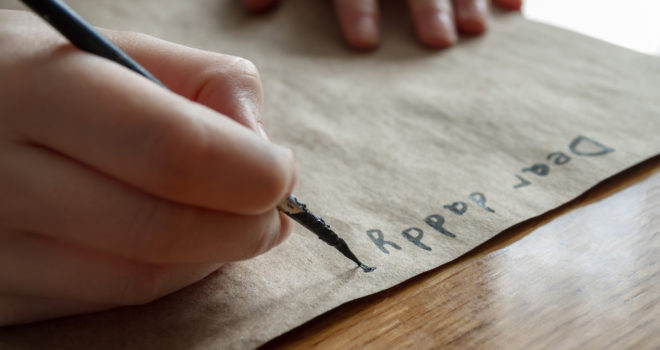On the wall of my bedroom is a framed poem entitled “My son and my best friend.” It was a gift from my father, that he had lovingly removed from the frame before giving it to me, so that he could add in Sharpie marker those two all-important words “love, Dad.” I received this present on my first day at college. Dad had slipped it into my sock drawer, in the box, so that I would find it after he and mom, and my brother and sister had dropped me off. Dad was a master of tugging at the heart strings. And receive it I did; it actually took days until I found it. But I found it when I was supposed to, by myself, first with confusion “What the heck is this that I have in my sock drawer?” Then, taking the box out and opening it, the eyes swelled and the heart overflowed, knowing that longing of every human heart—that I was loved.
And, you know what I did after? I buried it right back into the box, right back into the sock drawer, where I had found it. I didn’t tell even my roommate. He was from Japan, there was a language barrier, I wasn’t sure what his relationship with his father was like. And I was a tough college guy, I didn’t talk about those sort of things. In fact I buried it so deep in that drawer that it even took me years to tell my dad how much I appreciated it. In fact I buried it so deep that I’ve never spoken about it. It’s been twenty-five years and five months.
We talk about sharing that which we cherish, about sharing the faith. In Mark’s Gospel, loaded with the teaching of the Good News, we learn who Jesus was and are invited to follow Him like the fishermen. And it is culminated with Jesus announcing that this is the reason for which He has come – to share the Good News. In the Formed “Search” program, the videos and book, we see coupled the desire to evangelize all those that we know and love with all of this great news, acknowledging and announcing what we know and love. But, we cannot give what we do not have. I hope that somewhere in your years of following Christ and being a Catholic that you’ve found that beautiful poem that the Lord placed in the depths of your heart. That He signed, perhaps to be dramatic but truthful, He signed with the very blood of His only begotten Son—entitled my son, my daughter, and my best friend.
According to the statistics, there are number of Catholics that have never found God, that have never known that reality. Just weighed down by the baggage of life, attending to all of their daily needs —they maybe never got into that drawer and found the reality that was there. It’s just been buried for all of these years. If that’s the case with you I ask you, I invite you, to ask for it. It might sound too good to be true, but it’s not. That poem was written for each and every one of you as if you were the only son or daughter of the Lord. Ask for it in the quiet moments of the liturgy, as we pause after the homily, as we pause most intimately after the reception of Holy Communion, ask: Lord is this true? Can I accept this reality?
Maybe, like many, like myself with dad, maybe you saw it and then buried it again. You accepted it but couldn’t really acknowledge it because these are days when we just feel like Job and our life on earth is a drudgery. It’s just too much to spend time with that and I don’t know how to even acknowledge before the Lord that this is true. How can it be true, Lord, if life is such a drudgery day in and day out? But acknowledge it in this moment.
Right here and right now we hear the words of the Gospel that Jesus came and took the hand of Simon Peter’s mother-in-law. There she lie in bed sick with a fever. And He reached out and took her hand and raised her up. Notice He raised her up and then the fever left her. She followed Him and she accepted what He offered, she acknowledged it, she received it. And then grace was at work. That is what He invites us to, not just to see that hand extended once but to receive it, to take it in our own hands and let it lift us up, letting the fever of life out. But then there’s one more step. There’s the acceptance, there’s the acknowledgement, but then what happens to Simon Peter’s mother-in-law? She can’t help herself, right? Once that has happened, she has to serve. She has to go out and share that Good News immediately by taking care of those in her household. She got up and served them and, please God, we do as well. Once we accept and acknowledge we announce, we share that Good News of what has come to us.
Yes, I did receive, “for this reason I have come,” the Lord has said. The Lord gives us that great example when there is news so good that we cannot help ourselves. He could have been made king, a local personality, right there in that village, but instead He went to share. We honor St. Joseph, who did this in his own way as well. He accepted what he was called to, he acknowledged it, by taking Mary into his home. And then he announced it, he brought it where he was sent. Yes, to Bethlehem for the census; yes, to Egypt to flee from Herod; yes, eventually back to Nazareth as well. And so we ask for his intercession and that of his Immaculate Virgin Bride.
Our Lady of the Assumption, pray for us. St. Joseph, pray for us.
✠












